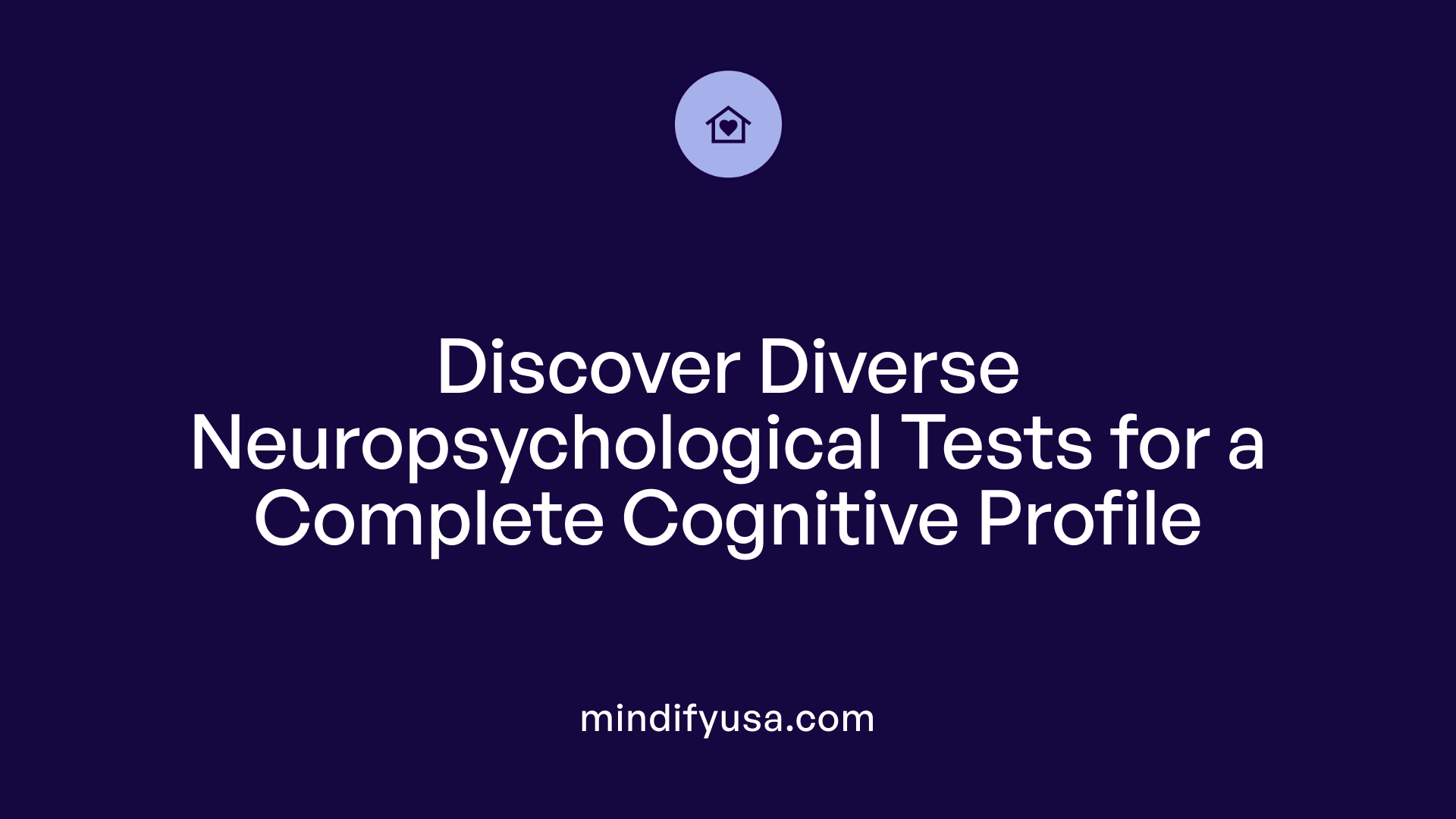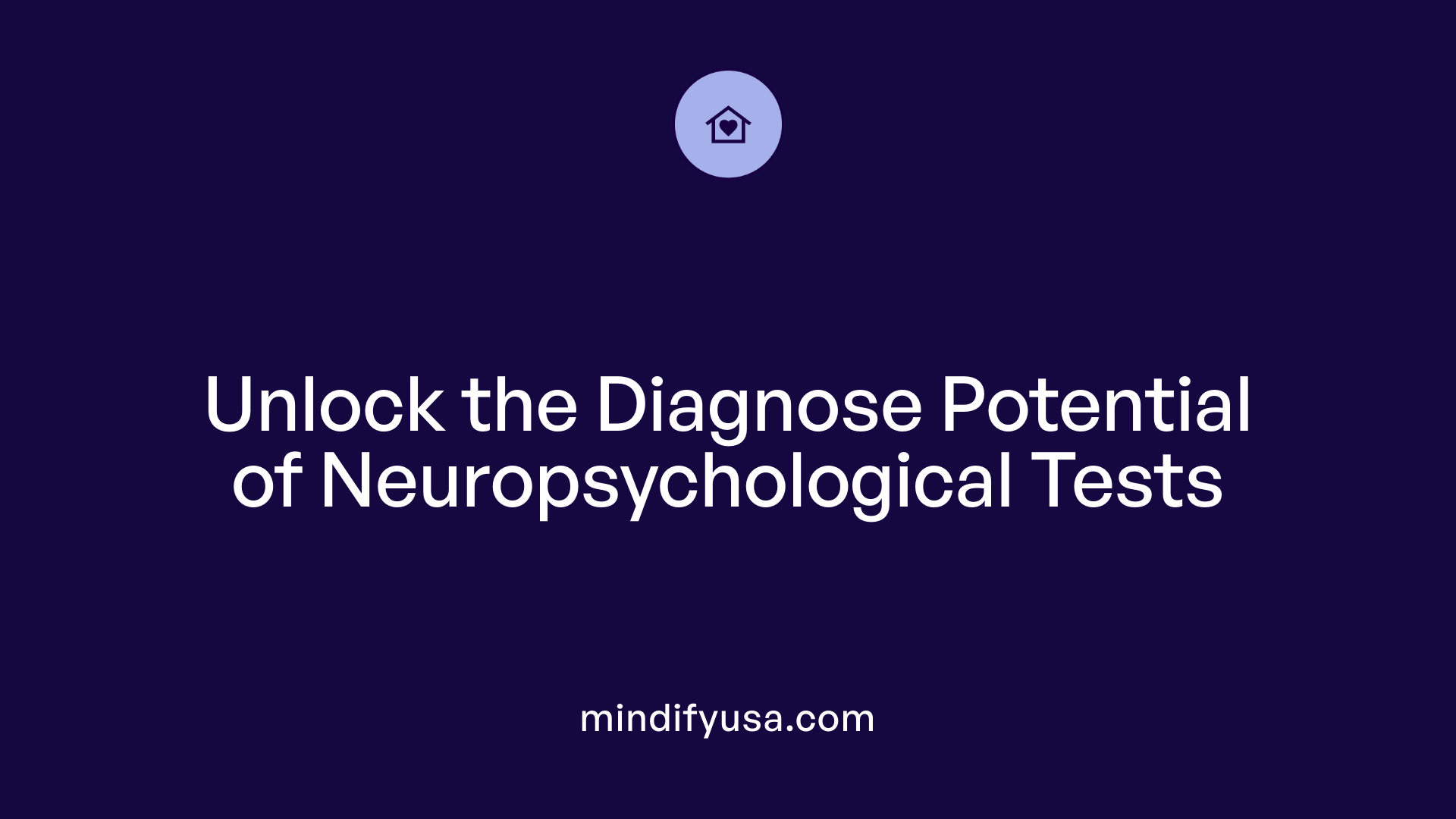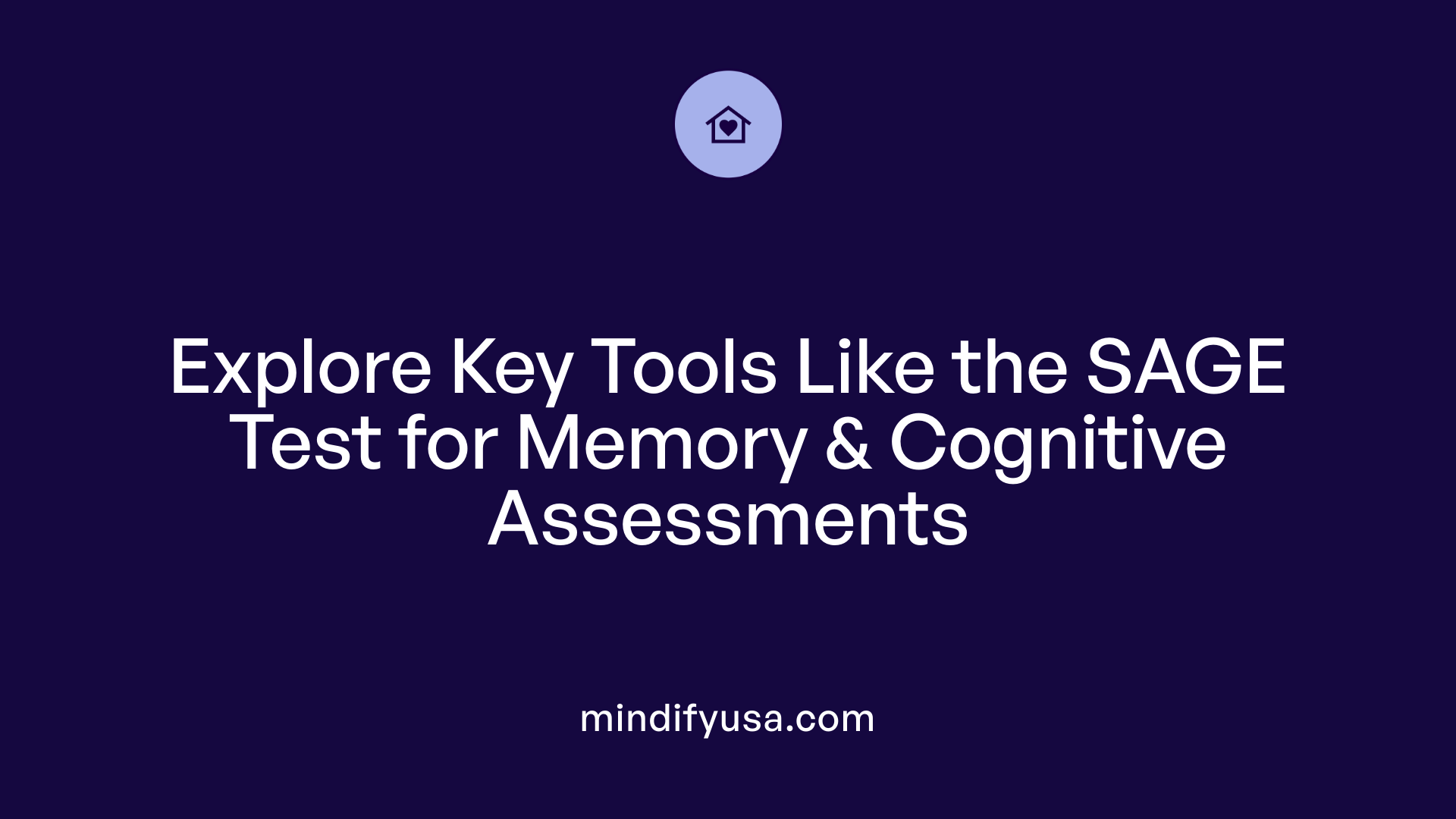Understanding Neuropsychological Testing and Its Role in Memory Evaluation
Neuropsychological testing is a comprehensive approach to evaluating brain function, especially in contexts where memory recall issues are evident. Conducted by trained neuropsychologists, these tests involve a series of structured assessments designed to pinpoint cognitive strengths and weaknesses, offering valuable insights into conditions like dementia, Alzheimer's disease, and other neurological disorders. This article explores the procedures, purposes, and specific assessments used in neuropsychological testing, emphasizing their importance in diagnosing and managing memory-related conditions.
Procedures and Methods of Neuropsychological Testing
What are neuropsychological testing procedures and methods?
Neuropsychological testing is a systematic process used to evaluate various aspects of brain function. It involves administering different standardized tasks and assessments that are carefully designed to measure a wide range of cognitive abilities. These abilities include memory, attention, language, reasoning, executive functions, visuospatial skills, and motor skills.
The tests used can be pencil-and-paper tasks, computer-based exercises, questionnaires, or oral questions. Each test follows specific guidelines outlined in detailed testing manuals, which ensure consistency and reliability across assessments. These manuals serve as a reference to standardize procedures, scoring, and interpretation.
The testing process typically begins with a comprehensive review of the patient's medical history, behavioral observations, and often an interview with the patient. In some cases, input from family members or caregivers is incorporated to provide additional context about the individual's cognitive and behavioral changes.
During the evaluation, neuropsychologists observe behavioral responses and emotional states, noting factors that might influence test performance, such as fatigue or anxiety. The neuropsychologist conducts the assessments in a quiet, comfortable environment to maximize accuracy.
After the testing session, which may last between 1.5 to 2 hours or longer depending on the scope, the neuropsychologist analyzes the scores by comparing them with normative data. This data is matched to the patient's age, educational background, and cultural factors to provide a meaningful context for the results.
Comparison with normative data allows professionals to identify areas of cognitive strength and weakness. These insights assist in diagnosing conditions such as dementia, traumatic brain injury, or learning disabilities. The results also guide treatment plans, help in monitoring disease progression, and inform recommendations for rehabilitation or compensatory strategies.
Overall, neuropsychological assessment procedures combine structured testing, behavioral observations, and careful interpretation to provide a detailed understanding of brain functioning. This comprehensive approach is essential in managing various neurological and psychiatric conditions effectively.
Purpose and Benefits of Neuropsychological Testing for Memory Recall Issues

What is the purpose of neuropsychological testing in assessing memory issues?
The main goal of neuropsychological testing is to carefully evaluate an individual’s mental functions, especially memory, in a detailed and objective way. This testing helps pinpoint where problems are occurring in the brain's ability to encode, store, and retrieve information.
These assessments serve multiple functions. Firstly, they assist in differentiating causes of memory difficulties. Such causes include neurological conditions like Alzheimer's disease and other dementias, brain injuries, mental health issues like depression or anxiety, and normal aging processes. By understanding the specific pattern of cognitive strengths and weaknesses, healthcare providers can better identify the root cause.
Secondly, neuropsychological tests guide diagnosis and treatment. The detailed results help specialists determine whether a person’s memory decline is related to a neurodegenerative disease, a psychiatric disorder, or other medical issues. This clarity allows for more accurate diagnosis and tailored therapies, including medications, cognitive rehabilitation, or behavioral interventions.
Further, these assessments establish a baseline of cognitive functioning. This baseline is essential for monitoring changes over time, especially in progressive conditions like dementia. Regular testing can track whether memory is declining, stabilizing, or improving with treatment.
Finally, neuropsychological evaluations support planning for the future. They inform decisions about daily living, safe driving, work capabilities, and legal considerations. In sum, these tests seek to improve quality of life by clarifying causes, enabling early intervention, and guiding personalized care strategies.
Types of Cognitive and Memory Assessments in Neuropsychology

What types of assessments are used in neuropsychological evaluations for memory and cognition?
Neuropsychological assessments employ a variety of standardized tests designed to evaluate different aspects of brain function, including memory, language, attention, visuospatial skills, and executive functions. These tests help identify cognitive strengths and weaknesses, crucial for diagnosis and treatment planning.
For quick screening, tools such as the Mini-Mental State Examination (MMSE) and the Montreal Cognitive Assessment (MoCA) are commonly used. These brief assessments are easy to administer and provide an overview of a person's cognitive status.
In addition to screening tools, comprehensive memory batteries are employed for detailed evaluation. Examples include the Wechsler Memory Scale (WMS) and the California Verbal Learning Test (CVLT). The WMS assesses different types of memory, such as immediate recall, delayed recall, and recognition. The CVLT measures learning and memory capabilities, especially verbal memory, analyzing how information is encoded and retrieved.
The Wechsler Adult Intelligence Scale (WAIS) offers insights into overall intelligence, with subtests that also evaluate specific skills like working memory and processing speed.
Specialized tests like the NEPSY are used to explore neurodevelopmental and neuropsychological functioning, focusing on children but also applicable in adult assessments for certain conditions.
Beyond memory, assessments extend to language abilities, motor skills, and mood evaluations, providing a full picture of cognitive health. These are typically conducted by trained neuropsychologists who interpret the results to aid in diagnosis.
The array of tools helps differentiate between normal aging, neurological conditions such as dementia, traumatic brain injuries, and psychiatric disorders. The detailed insights facilitate targeted interventions, monitor progression, and improve patient outcomes.
Overview of Common Neuropsychological Tests
| Test Name | Purpose | Main Focus | Additional Details |
|---|---|---|---|
| MMSE | Quick screening | General cognition | Administered in 5-10 mins, used for initial assessment |
| MoCA | Cognitive screening | Mild cognitive impairment | More sensitive than MMSE, covers multiple domains |
| WMS | Memory assessment | Different memory types | Usually detailed, used in clinical diagnosis |
| CVLT | Verbal learning | Verbal memory | Includes list-learning and recognition tasks |
| WAIS | General intelligence | Multiple cognitive domains | Subtests evaluate working memory, reasoning |
| NEPSY | Neuropsychological development | Children and some adult assessments | Tasks include language, memory, attention |
| SAGE | Early impairment detection | Mild cognitive impairment | Brief, self-administered, specific for early detection |
How are assessments tailored?
Tests are customized based on individual needs, age, educational background, and specific clinical concerns. This personalization enhances diagnostic accuracy and helps target therapy effectively.
Practical Applications
Assessments play a vital role in diagnosing conditions like Alzheimer's disease, differentiating types of dementia, tracking disease progression, and guiding interventions. They are essential in legal and occupational settings, such as evaluating fitness to drive or work.
Overall, neuropsychological evaluations are comprehensive, measuring multiple domains to develop a detailed understanding of the brain's function related to memory and cognition. This approach ensures early detection of impairments, accurate diagnoses, and personalized intervention plans.
Diagnosing Memory-Related Conditions with Neuropsychological Testing

How does neuropsychological testing aid in diagnosing memory-related conditions such as dementia and Alzheimer’s disease?
Neuropsychological testing is an essential tool for diagnosing memory-related conditions, including dementia and Alzheimer’s disease. It provides detailed insights into how well different areas of the brain are functioning by assessing multiple cognitive domains such as memory, attention, language, and problem-solving skills.
During the tests, individuals may be asked to memorize lists, recall stories, solve puzzles, and perform tasks on a computer or with paper and pencil. The results highlight specific patterns of strengths and weaknesses, which can reveal early signs of cognitive decline that might not yet be obvious in everyday activities.
One of the main benefits of these assessments is their ability to detect subtle impairments early in the disease process. This early detection is crucial because it allows for timely intervention, which can slow progression and improve quality of life.
Neuropsychological tests also help differentiate between different types of dementia. For example, Alzheimer’s disease typically involves early episodic memory impairment, whereas other dementias may show different cognitive profiles. Recognizing these patterns helps clinicians pinpoint the exact condition more accurately.
Furthermore, these evaluations serve as a baseline to monitor how cognitive functions change over time. Repeated testing can track disease progression, guide treatment adjustments, and inform care planning.
Sharing the results with patients and their families enhances understanding and helps them make informed decisions about treatment options, lifestyle changes, and support services. Overall, neuropsychological testing supports comprehensive diagnosis, effective management, and personalized care for individuals facing memory decline.
Early Detection and Management of Memory Problems

What is the role of neuropsychological testing in early detection and management of memory problems?
Neuropsychological testing is an essential tool for identifying early signs of memory decline and other cognitive changes. These assessments evaluate crucial mental functions such as episodic memory, language, attention, and executive functioning. Because they can detect subtle deficits that might not be obvious in daily life, neuropsychological tests often reveal early indicators of conditions like mild cognitive impairment or the initial stages of dementia.
By comparing patient performance with standardized data for similar age and educational background, clinicians can distinguish normal aging from pathological decline. This differentiation is vital to avoid misdiagnosis and to tailor timely treatment plans. For example, patterns of memory and cognitive deficits observed during testing can point toward specific neurodegenerative diseases like Alzheimer’s, facilitating early and accurate diagnosis.
Furthermore, these evaluations help predict disease progression. They provide detailed profiles of strengths and weaknesses, which can guide interventions aimed at slowing cognitive decline and maintaining functional independence. In particular, assessments of episodic memory, a common early feature of Alzheimer’s disease, help monitor changes over time and evaluate the impact of treatments.
Neuropsychological testing also supports the differential diagnosis between various causes of memory problems, including brain injury, depression, anxiety, and normal aging. This differentiation is crucial for selecting appropriate therapies and planning long-term management.
How do these assessments help differentiate normal aging from more serious conditions?
Standardized neuropsychological tests can distinguish normal age-related cognitive changes from early signs of neurodegenerative diseases. Normal aging typically involves minor, non-progressive changes, whereas conditions like dementia show characteristic patterns of decline across multiple cognitive domains.
Tests such as the Mini-Mental State Examination (MMSE) or Montreal Cognitive Assessment (MoCA) are quick screening tools used in primary care. For more detailed evaluation, comprehensive neuropsychological assessments are conducted by trained professionals, sometimes taking up to two hours.
Results from these assessments identify specific patterns consistent with disorders such as Alzheimer’s (episodic memory impairment), frontotemporal dementia (language and executive function deficits), or Lewy body dementia (visuospatial impairments). Recognizing these patterns early allows for setting realistic expectations, planning appropriate interventions, and engaging patients in clinical trials if suitable.
When should assessments be conducted?
Timing is critical in managing cognitive health. Neuropsychological evaluations are recommended when there are noticeable changes in memory, thinking, or behavior that affect daily life. Early assessment enables intervention when it can be most effective.
Regular monitoring through periodic testing is also beneficial, especially for individuals at higher risk due to genetic factors, family history, or existing health conditions like hypertension or diabetes. In clinical practice, brief cognitive screening tools such as the SAGE test, Mini-Cog, or the General Practitioner Assessment of Cognition can be used during routine check-ups to identify individuals who require more comprehensive testing.
Ultimately, early and appropriately timed assessments facilitate early diagnosis of cognitive decline, guide treatment decisions, and improve long-term outcomes.
Performance profiles and diagnostic markers
Neuropsychological tests produce detailed profiles of cognitive functioning, enabling clinicians to track changes over time. These profiles highlight areas of preserved ability and specific deficits, providing insight into the underlying pathology.
Particular neuropsychological markers, such as episodic memory impairment, reduced processing speed, and executive dysfunction, have high diagnostic value. When interpreted alongside clinical history and neuroimaging, they contribute significantly to accurate diagnosis and the differentiation of various neurological and psychiatric conditions.
| Assessment Tool | Cognitive Domain Assessed | Typical Use | Specific Markers Evident | Optimal Timing | Additional Notes |
|---|---|---|---|---|---|
| MMSE | General cognition | Initial screening | Orientation, recall | During routine visits | Brief, quick to administer |
| MoCA | Mild cognitive impairment detection | Early assessment | Executive function, memory | When subtle deficits suspected | Useful for early detection |
| SAGE | Thinking abilities, early impairment | Differentiating normal aging from impairment | Memory retention, reasoning | During initial cognitive issues | Self-administered, quick |
| Comprehensive neuropsychological battery | Multiple cognitive domains | Differential diagnosis, tracking progression | Memory, language, attention, executive function | Confirmatory testing, long-term monitoring | Conducted by specialists |
In summary, neuropsychological testing provides critical insights into brain health, enabling early diagnosis and targeted management of memory and cognitive problems. Its detailed performance profiles and biomarkers support clinicians in differentiating normal age-related changes from serious neurodegenerative conditions, ultimately improving patient outcomes and quality of life.
Specific Tests Relevant to Memory Recall and Cognitive Function — SAGE Test and Beyond

Are there specific tests such as the SAGE test that are relevant to memory recall issues?
Yes, there are specialized assessments designed to evaluate memory recall and overall cognitive health, and one notable example is the SAGE (Self-Administered Gerocognitive Exam). This test is developed to quickly screen for early signs of cognitive, memory, and thinking impairments.
The SAGE test is brief, taking only a few minutes to complete, and can be self-administered, making it accessible for use in primary care settings. It evaluates various cognitive domains, including memory, language, visuospatial abilities, reasoning, and executive function. By covering multiple areas, the SAGE provides a comprehensive snapshot of an individual's brain function.
In terms of validation, studies have shown that the SAGE has a sensitivity of about 79 percent in detecting cognitive impairment, with a low false positive rate of 5 percent. Such accuracy makes it a reliable tool for early detection of issues like mild cognitive impairment (MCI) and early dementia.
While the SAGE is valuable as an initial screening method, it is not a diagnostic tool in itself. Rather, it helps identify individuals who should undergo more detailed neuropsychological testing and clinical evaluation. Due to its ease of use and scientific backing, the SAGE has become an important part of the early detection process for memory and cognitive problems.
What other memory and cognitive assessment tools are available?
Besides the SAGE test, healthcare providers utilize a variety of other standardized assessments to evaluate memory recall and related functions. These tools vary in complexity, duration, and purpose but all serve to inform diagnosis and guide treatment.
Commonly used instruments include:
| Test Name | Purpose | Format | Cognitive Domains Assessed | Suitable Settings |
|---|---|---|---|---|
| Mini-Mental State Examination (MMSE) | General cognitive screening | Paper-based | Orientation, memory, attention, language | Clinics, hospitals |
| Montreal Cognitive Assessment (MoCA) | Detects mild cognitive impairment | Paper-based | Memory, attention, language, visuospatial | Primary care, research |
| WAIS and WISC | Testing intelligence | Standardized IQ tests | Language, memory, reasoning | Neuropsychological evaluation |
| CVLT and RAVLT | Verbal learning and memory | Word list learning | Memory encoding, retention, recall | Detailed neuropsychological testing |
| Rey-Osterrieth and Block Design | Visuospatial skills | Drawing and construction tasks | Visuospatial memory, planning | Comprehensive assessments |
These assessments involve tasks like repeating word lists, story recall, object naming, complex shape copying, and problem-solving exercises. Their results are compared to age-matched norms, helping clinicians pinpoint specific deficits.
How do these tests assist in diagnosing and managing cognitive health?
Neuropsychological assessments can differentiate between normal aging, stress, depression, anxiety, and more serious conditions like dementia or Alzheimer's disease. Early and accurate detection allows for timely intervention, treatment planning, and lifestyle adaptations.
Furthermore, repeated testing over time helps monitor disease progression or response to therapy. The tests also offer insights into a person’s functional abilities, including daily activities and driving safety.
In addition to clinical use, select brief tests like the Mini-Cog and the General Practitioner Assessment of Cognition are recommended by organizations like the Alzheimer's Association for quick screening tasks in primary care settings. These tools maximize early detection efforts and facilitate referrals for comprehensive evaluation.
By integrating these assessments into routine check-ups, healthcare providers can catch cognitive decline early, offering better outcomes and improved quality of life for affected individuals.
Enhancing Diagnosis and Care Through Cognitive Testing
Neuropsychological testing is an indispensable tool in the modern approach to evaluating and managing memory recall issues. By providing a detailed picture of cognitive functioning, these assessments enable healthcare providers to diagnose conditions such as dementia and Alzheimer’s disease accurately and early. They facilitate targeted interventions, monitor disease progression, and support personalized treatment plans. As research advances and new tools like the SAGE test gain prominence, early detection and effective management of memory problems become increasingly achievable. Ultimately, neuropsychological evaluations enhance patients’ quality of life by clarifying cognitive concerns and guiding appropriate therapeutic responses.
References
- Neuropsychological Testing: What It Is, Purpose & Procedure
- Neuropsychological testing for dementia
- Cognitive and Neuropsychological Tests
- Neuropsychological Evaluations in Adults
- Cognitive Screening and Assessment
- Neuropsychological Tests: Purpose, Procedure, and Results
- Neuropsychological Testing
- SAGE - Memory Disorders
- Neuropsychological Testing and Evaluations
- A Primer in Neuropsychological Assessment for Dementia





































































































